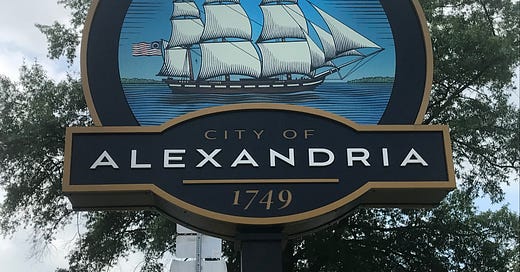Some questions about local governance are difficult to answer.
An example: How did the Alexandria City Public Schools open two new schools, Douglas MacArthur Elementary School in 2023 and the Minnie Howard Campus of Alexandria City High School in 2024, with solar panels that are not working because the cost – estimated at a total of $1.4 million – of connecting them to the electric grid is too high?
The answer may lie in two important and connected aspects that affect how the city and ACPS work that are frequently overlooked: contract administration and corporate or institutional memory.
There are some things the city does well: A pothole was recently repaired in Rosemont less than 24 hours after the submission of a 311 request. Even so, there are projects with permanent defects, for example, the incorrectly sized swimming pool at the Chinquapin Recreation Center, that could have been executed better.
Ascertaining exactly how city or school projects sometimes go off the rails can be difficult or impossible.
Staying with the pothole and solar panels examples, the rapid response and job completion on the pothole was managed entirely by city personnel. The Douglas MacArthur and Minnie Howard projects involved architectural and engineering expertise for building systems and design from outside contractors working with ACPS personnel. Even though there were numerous people with design and planning responsibilities, the interconnection cost of the solar panels should not have come as a surprise.
It would be difficult to develop a precise account of who forgot, overlooked, or knew and failed to report the cost of connecting the solar panels. As the proverb states, “Success has many fathers, but failure is an orphan.” In the absence of a definitive explanation, the solar panel grid connection problem seems to have been a contract administration failure.
We sometimes overlook everyday activities that the city contracts out. If a tree is poorly planted or maintained on a street or another public place, it is the city, through the Department of Recreation, Parks & Cultural Activities, that is responsible. However, it is highly probable that the actual tree planting and pruning was done by a contractor, often Davey Tree.
It is tempting to assume that everything would be great, or much improved, if only city and ACPS personnel were better at administering and managing work performed by outside contractors.
Corporate, or institutional memory, is another important and overlooked factor in the success of city and ACPS operations. Corporate memory about an issue can be important to seeing its complexities, which is an essential step to a resolution, or at least a better path forward.
Those of my generation may overvalue corporate memory because it reflects our lived experience. And, a certain amount of administrative personnel turnover is inevitable. Corporate memory is also affected by the results of elections. For a newly elected local officeholder, the first year or so is mostly training and orientation, particularly with respect to the operating and capital budgets.
It’s difficult to quantify whether city and ACPS operations have been compromised by a lack of corporate memory caused by frequent turnover of senior staff and elected officials. But it appears likely.
Years ago, I asked an experienced Alexandria officeholder what worried them about the city’s future. I was expecting a sage reply about the city’s reliance on residential real estate taxes, or something similar. The answer, paraphrased, was, “I worry about the lack of corporate memory, particularly when I see we are about to make a mistake that we made in the past.”
The quality of contract administration of city and ACPS activities is affected by deficits in corporate memory. Things should not automatically be done as they were back in the day, but experience can provide valuable lessons.
The writer is a former lawyer, member of the Alexandria School Board from 1997 to 2006 and English teacher from 2007 to 2021 at T.C. Williams High School, now Alexandria City High School.
Thanks for reading About Alexandria!
Subscribe for free to receive new posts.





I appreciate Helen Manich flagging Dominion's role in this and Senator Ebbin's work to improve the situation. There is a strong argument that, as a regulated public utility, Dominion ought to be required to bear the interconnection cost (which it could then roll into its rate base and eventually recover from all of its customers). The environmentally (and climate)-friendly trend in this policy area has been toward promoting distributed power generation and net-metering -- i.e., toward promoting installation by electricity consumers of small solar (and other renewable) projects and allowing them to sell their power to the connected utility when they generate more power than they need. The utility companies of course hate this -- but we, the electorate, ought to be able to say "too bad!" With a Democratic governor, we might be able to get something even better than Senator Ebbin's bill enacted.
As someone who has owned homes with rooftop solar in 3 different states, I can say with conviction that the mystical "powers that be"--particularly the power companies--try very hard to find obstacles to allowing independent solar to succeed. The result is a solar industry that is very fragmented and weak. It's a series of sad stories.